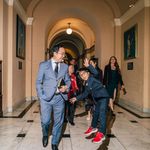President Obama hijacked the TV airwaves last night for his first prime-time press conference, as part of his recent campaign to muster up support for his economic stimulus package. After completing his opening statement on the severity of the economic crisis and the need for action, Obama spent the remainder of the hour taking questions from the press corps on issues ranging from the stimulus bill (obviously) to Iran, Joe Biden, and even A-Rod (Obama is against taking steroids, in case you were wondering). Little news was made, but Obama did take a question from the Huffington Post’s Sam Stein, the first time a blog has been called on in such a forum. Hooray for the changing media landscape and future trivia questions. Anyway, although Obama probably didn’t win over many fans of House or Chuck, his controlled performance impressed most observers, when it wasn’t boring them.
• Howard Kurtz says Obama “controlled the tone of the East Room proceedings, speaking with utmost seriousness, gesturing with his hands and displaying a command of the facts.” [WP]
• Jeff Zeleney writes that the White House’s “strategy was to avoid making news. On that score, Mr. Obama seemed to succeed.” [Caucus/NYT]
• Josh Marshall gets the sense that “every day Republicans keep this guy off TV is a win for them. Like every great pol, Obama’s a great communicator. And he’s making the argument.” [Talking Points Memo]
• Michelle Malkin mocks “the hard-hitting question about Obama’s reaction to Alex Rodriguez and his steroid use. What a bunch of oxygen-wasters.” [Michelle Malkin]
• George Stephanopoulos gives Obama an “A” for the sale, because Obama was “able to really get his message across.” As for reaching out to Republicans, he gets a “B.” You could see “a real, inherent tension between the president’s promise of bipartisanship, of reaching out the other side, and his promise of fundamental policy change.” [George’s Bottom Line/ABC News]
• Mike Madden says “a calm, confident President Obama … easily drove home a twofold message to anyone watching — he didn’t cause the mess we’re in, but he intends to solve it.” [Salon]
• David Corn thinks Obama “stuck to his message with discipline and eloquence,” but wonders why he didn’t call on “his millions of supporters to pressure Congress to pass the stimulus bill.” [Mojo/Mother Jones]
• Walter Shapiro asserts that “Obama radiated the sense of a leader who has digested too many economic briefings and memorized too many talking points in preparation for his primetime rendezvous with the public.” For his next press conference, “he might consider taking his stage cues from that White House master of brevity known as Silent Cal Coolidge.” [New Republic]
• Mark Silva says that with his long answers, “the president has controlled the evening — important for a leader who already enjoys stong [sic] public support in his confrontation with Republicans in Congress.” [Swamp/Chicago Tribune]
• Steve Chaggaris notes that whenever Obama wasn’t asked about the stimulus, “he either turned his answers away from the original question back to his points about the merits of the stimulus or parried by either not answering the question or relying on statements he has made in the past.” [Political Hotsheet/CBS News]
• Alex Koppelman writes that Obama “projected an air of competence and calm, made no serious mistakes, seemed to truly know his material.” But consequently, “good God, it was boring.” [War Room/Salon]
• Matt Yglesias was struck by the fact “that a lot of America’s high-powered political journalists seem, at least as evidenced by the questions they ask, to have a very poor grasp of macroeconomic issues.” Which would be fine, except they’re writing about them. [Think Progress]
• John Dickerson calls the performance “systematic, commanding, at times belabored, and a test of a new kind of political communication.” But it’s unclear if his patience “created the sense of urgency he was aiming for and whether he characterized his opponents as powerfully and acutely as necessary to reframe the debate on his terms.” [Slate]
• Mark Hemingway contends the whole thing “was, frankly, boring and long-winded. His answer to the first question was an unforgivably meandering and pointless 10 minutes.” [Corner/National Review]
• Chris Cillizza notes that “as the debate on Capitol Hill has gotten more partisan, the president has appeared more and more willing to put the blame on the GOP,” and last night he “repeatedly referenced the fact that he has ‘inherited’ the economic morass in which the country currently finds itself.” [Fix/WP]
• John Podhoretz felt “Obama was, overall, rather dazzling tonight, and did, I think, exactly what he wanted to do, which is use the bully pulpit and his popularity to change the momentum on the stimulus, which has been running in the other direction.” [Contentions/Commentary]
• Steve Benen was relieved to finally “have a chief executive who knows what he’s talking about.” [Political Animal/Washington Monthly]
• Michael Goldfarb claims Obama “set up one strawman after another. It’s a rhetorical device that Obama used to good effect during the campaign, but as president it’s bad form.” [Blog/Weekly Standard]
• Carol Platt Liebau insists that Obama’s “press conference had to be an enormous disappointment to anyone who had really believed his hype about bringing ‘hope’ and ‘change’ to Washington.” His tone was “peevish and almost panicky” and “his characterization of the bill’s opponents was as dishonest as it was insulting.” [Town Hall]
• Matthew Cooper believes Obama “handled himself with great aplomb,” and “the contrast with George W. Bush couldn’t have been more striking.” [Talking Points Memo DC]





























